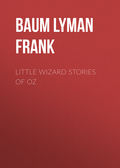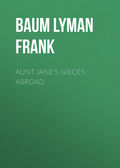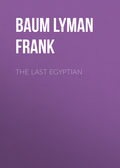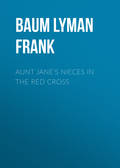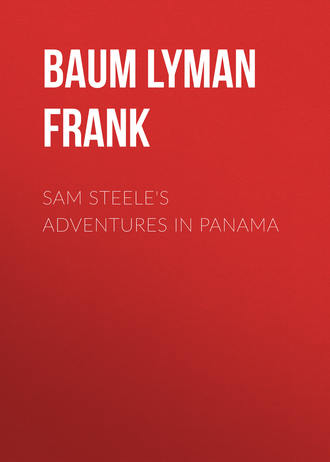
Лаймен Фрэнк Баум
Sam Steele's Adventures in Panama
CHAPTER IV
WE COME TO GRIEF
Fortune seemed to favor the voyage of the Gladys H. All the way to Hatteras the weather was delightful and the breeze fresh and constant. There was not a moment when the sails were not bulging to some extent and in spite of the old ship’s labored motion we made excellent time.
However, I followed my instructions, keeping well in toward the coast, and so crept steadily down to Key West.
Here an important proposition confronted us: whether to enter the Gulf of Mexico and follow its great circle near to the shore – a method that would require weeks – or run across to Cuba and then attempt the passage of the Caribbean by the short cut to Colon or Porto Bella. We had canvassed this alternative before I left harbor; but Mr. Harlan had maintained that I must decide the question for myself, being guided by the actions of the bark and the condition of the weather.
Both these requirements seemed favorable for the short cut. The ship had behaved so far much better than I had expected, and the good weather seemed likely to hold for some time longer.
So after a conference with Ned Britton – for Uncle Naboth refused to “mix up in the business” or even to offer an opinion – I decided to take the chances and follow the shortest route. After reaching Colon I would keep close to land way down to the Horn.
So we stood out to sea, made Cuba easily, and skirted its western point to the Isles de Pinos. Still the skies were clear and the breeze favorable, and with good courage we headed south in a bee-line for Colon.
And now we were in the Caribbean, that famous sea whose very name breathes romance. It recalls to us the earliest explorers, the gold seekers and buccaneers, the fact that scarce an inch of its rippling surface is unable to boast some tragedy or adventure in the days of the Spanish Main, when ships of all nations thronged the waters of the West Indies.
For three whole days luck was our bedfellow; then, as Uncle Naboth drily remarked, it “went a fishin’” and left us to take care of ourselves.
With gentle sighs our hitherto faithful breeze deserted us and our sails flapped idly for a time and then lay still, while the ship floated upon a sheet of brilliant blue glass, the tropic sun beat fiercely down upon us, and all signs of life and animation came to an end.
No sailor is partial to calms. A gale he fights with a sense of elation and a resolve to conquer; a favoring breeze he considers his right; but a glassy sea and listless, drooping sails are his especial horror. Nevertheless, he is accustomed to endure this tedium and has learned by long experience how best to enliven such depressing periods.
Our men found they possessed a violinist – not an unskilled fiddler by any means – and to his accompanying strains they sang and danced like so many happy children.
Uncle Naboth and Ned Britton played endless games of pinochle under the deck awning and I brought out my favorite books and stretched myself in a reclining chair to enjoy them.
Duncan Moit paced deliberately up and down for the first two days, engrossed in his own musings; then he decided to go over his machine and give it a careful examination. He removed the cover, started his engines, and let them perform for the amusement of the amazed sailors, who formed a curious but respectful group around him.
Finally they cleared a space on the deck and Moit removed the guy-ropes that anchored his invention and ran his auto slowly up and down, to the undisguised delight of the men. He would allow six or eight to enter the car and ride – sixteen feet forward, around the mainmast, and sixteen feet back again – and it was laughable to watch the gravity of their faces as they held fast to the edge, bravely resolving to endure the dangers of this wonderful mode of locomotion. Not one had ever ridden in an automobile before, and although Moit merely allowed it to crawl over its confined course, the ride was a strange and fascinating experience to them.
I must allow that the performances of this clever machine astonished me. The inventor was able to start it from his seat, by means of a simple lever, and it was always under perfect control. The engines worked so noiselessly that you had to put your ear close in order to hear them at all, and the perfection of the workmanship could not fail to arouse my intense admiration.
“If this new metal is so durable as you claim,” I said to Moit, “the machine ought to last for many years.”
“My claim is that it is practically indestructible,” he answered, in a tone of conviction.
“But you have still the tire problem,” I remarked. “A puncture will put you out of business as quickly as it would any other machine.”
“A puncture!” he exclaimed. “Why, these tires cannot puncture, sir.”
“Why not?”
“They are not inflated.”
“What then?”
“It is another of my inventions, Mr. Steele. Inside each casing is a mass of sponge-rubber, of a peculiarly resilient and vigorous character. And within the casing itself is embedded a net of steel wire, which will not allow the vulcanized rubber to be cut to any depth. The result is an excellent tire that cannot be punctured and has great permanency.”
“You do not seem to have overlooked any important point,” I observed, admiringly.
“Ah, that is the one thing that now occupies my mind,” he responded, quickly. “That is why I have been testing the machine today, even in the limited way that is alone possible. I am haunted by the constant fear that I have overlooked some important point, which another might discover.”
“And have you found such a thing?”
“No; to all appearances the device is perfect. But who can tell what may yet develop?”
“Not I,” with a smile; “you have discounted my mechanical skill already. To my mind the invention seems in every way admirable, Mr. Moit.”
For nine days we lay becalmed, with cloudless skies above and a tranquil sea around us. During the day we rested drowsily in the oppressive heat, but the nights were always cooler and myriads of brilliant stars made it nearly as light as day. Ned had taken in every yard of canvas except a square sail which he rigged forward, and he took the added precaution to lash every movable thing firmly to its place.
“After this, we’ve got to expect ugly weather,” he announced; and as he knew the Caribbean well this preparation somewhat dismayed me. I began to wish we had entered the Gulf of Mexico and made the roundabout trip; but it was too late for regrets now, and we must make the best of our present outlook.
Personally I descended into the hold and examined with care the seams, finding that the calking had held securely so far and that we were as right and tight as when we had first sailed. But even this assurance was not especially encouraging, for we had met with no weather that a canoe might not have lived through without shipping more than a few drops of sea.
The ninth day was insufferably hot, and the evening brought no relief. Ned Britton’s face looked grave and worried, and I overheard him advising Duncan Moit to add several more anchor ropes to those that secured his machine.
We awaited the change in the weather anxiously enough, and toward midnight the stars began to be blotted out until shortly a black pall overhung the ship. The air seemed vibrant and full of an electric feel that drew heavily upon one’s nerves; but so far there had been no breath of wind.
At last, when it seemed we could wait no longer, a distant murmur was heard, drawing ever nearer and louder until its roar smote our ears like a discharge of artillery. The ship began to roll restlessly, and then the gale and the waves broke upon us at the same instant and with full force.
Heavily weighted and lazy as the bark was, she failed to rise to the first big wave, which washed over her with such resistless power that it would have swept every living soul away had we not clung desperately to the rigging. It seemed to me that I was immersed in a wild, seething flood for several minutes; but they must have been seconds, instead, for presently the water was gone and the wind endeavoring to tear me from my hold.
The square sail held, by good luck, and the ship began to stagger onward, bowing her head deep and submitting to constant floods that washed her from end to end. There was not much that could be done to ease her, and the fervid excitement of those first hours kept us all looking after our personal safety. Along we went, scudding before the gale, which maintained its intensity unabated and fortunately drove us along the very course we had mapped out.
The morning relieved the gloom, but did not lessen the force of the storm. The waves were rolling pretty high, and all faces were serious or fearful, according to the disposition of their owners. In our old Saracen, or even the Flipper, I would not have minded the blow or the sea, but here was a craft of a different sort, and I did not know how she might stand such dreadful weather.
I got Ned into the cabin, where we stood like a couple of drenched rats and discussed the situation. On deck our voices could not be heard.
“Are the small boats ready to launch?” I asked.
“All ready, sir; but I doubt if they’d live long,” he replied. “However, this ’ere old hulk seems to be doin’ pretty decent. She lies low, bein’ so heavy loaded, an’ lets the waves break over her. That saves her a good deal of strain, Sam. If she don’t spring a-leak an’ the cargo holds steady, we’ll get through all right.”
“Tried the pumps?”
“Yes; only bilge, so far.”
“Very good. How long will the gale last?”
“Days, perhaps, in these waters. There’s no rule to go by, as I knows of. It’ll just blow till it blows itself out.”
He went on deck again, keeping an eye always on the ship and trying to carry just enough canvas to hold her steady.
Duncan Moit and Uncle Naboth kept to the cabin and were equally unconcerned. The latter was an old voyager and realized that it was best to be philosophical; the former had never been at sea before and had no idea of our danger.
On the third morning of this wild and persistent tempest the boatswain came to where Ned and I clung to the rigging and said:
“She’s leaking, sir.”
“Badly?”
“Pretty bad, sir.”
“Get the pumps manned, Ned,” said I; “I’ll go below and investigate.”
I crawled into the hold through the forecastle cubby, as we dared not remove the hatches. I took along a sailor to carry the lantern, and we were not long in making the discovery that the Gladys H. was leaking like a sieve. Several of the seams that Mr. Harlan had caused to be calked so carefully had reopened and the water was spurting through in a dozen streams.
I got back to my cabin and made a careful examination of the chart. According to my calculations we could not be far from the coast of Panama. If I was right, another six hours would bring us to the shore; but I was not sure of my reckoning since that fearful gale had struck us. So the question whether or no the ship could live six hours longer worried me considerably, for the pumps were of limited capacity and the water was gaining on us every minute.
I told Uncle Naboth our difficulty, and Duncan Moit, who stood by, listened to my story with lively interest.
“Will you try to beach her, Sam?” enquired my uncle, with his usual calmness.
“Of course, sir, if we manage to float long enough to reach the land. That is the best I can hope for now. By good luck the coast of Panama is low and marshy, and if we can drive the tub aground there the cargo may be saved to the owners.”
“Ain’t much of a country to land in, Sam; is it?”
“Not a very lovely place, Uncle, I’m told.”
“It’s where they’re diggin’ the canal, ain’t it?”
“I believe so.”
“Well, we may get a chance to see the ditch. This ’ere travellin’ is full of surprises, Mr. Moit. I never thought to ’a’ brung a guide book o’ Panama, or we could tell exactly where they make the hats.”
The inventor appeared ill at ease. I could understand the man’s disappointment and anxiety well enough. To beach his beloved machine on a semi-barbarous, tropical shore was not what he had anticipated, and I had time to feel sorry for him while thinking upon my own troubles.
He followed me on deck, presently, and I saw him take a good look at the sea and shake his head despondently. The Convertible Automobile might work in ordinary water, but it was not intended for such mammoth waves as these.
Then he watched the men at the pumps. They worked with a will, but in that cheerless way peculiar to sailors when they are forced to undertake this desperate duty. The ocean was pushing in and they were trying to keep it out; and such a pitiful struggle usually results in favor of the ocean.
Suddenly Moit conceived a brilliant idea. He asked for a length of hose, and when it was brought he threw off the covering of his machine and succeeded in attaching the hose to his engines. The other end we dropped into the hold, and presently, despite the lurching and plunging of the ship, the engines started and a stream the full size of the hose was sucked up and sent flowing into the scruppers. It really did better work than the ship’s pumps, and I am now positive that this clever arrangement was all that enabled us to float until we made the coast.
In the afternoon, while the gale seemed to redouble its force, we sighted land – low, murky and uninteresting, but nevertheless land – and made directly for it.
Darkness came upon us swiftly, but we held our course, still pumping for dear life and awaiting with tense nerves the moment of impact.
What this shore, of which we had caught a glimpse, might be like I did not know, more than that it was reported low and sandy at the ocean’s edge and marshy in the interior. There were a few rocky islands at the south of the isthmus, and there might be rocks or breakers at any point, for all we knew. If the ship struck one of these we were surely doomed.
On and on we flew, with blackness all round us, until on a sudden the bow raised and our speed slackened so abruptly that we were all thrown prostrate upon the deck. The mainmast snapped and fell with a deafening crash, and slowly the ship rolled to starboard until the deck stood at a sharp angle, and trembled a few brief moments, and then lay still.
The voyage of the Gladys H. was at an end.
CHAPTER V
MAKING THE BEST OF IT
“Are you there, Sam?”
“Yes, Ned.”
“Safe and sound?”
“I think so.”
Overhead the wind still whistled, but more moderately; around me I could hear the men stirring, with an occasional groan. We had come from the tempest-tossed seas into a place of comparative quiet, which just now was darker than the pocket of Erebus.
I found the after cabin and slid down the steps, which inclined sidewise. Inside, however, the hanging lamps had withstood the shock and still cast a dim light over the room. I found Uncle Naboth reclining upon a bench with his feet braced against the table, while he puffed away complacently at one of his enormous cigars.
“Stopped at a way station, Sam?” he enquired.
“So it appears, Uncle.”
“Any damage?”
“Can’t tell, yet. Were you hurt?”
He exhibited a great lump on his forehead, but smiled sweetly.
“You should ’a’ seen me dive under the table, Sam. It were a reg’lar circus, with me the chief acrobat. Where are we?”
“I’m going to find out.”
I unhooked both the lanterns and started up the companion-way with them. Rather than remain in the dark Uncle brought himself and his cigar after me.
I gave Ned one of the lights and we began to look about us. Duncan Moit lay unconscious beside his machine, the engines of which were still running smoothly. I threw back the lever and stopped them, and then a couple of seamen carried the inventor into the cabin. Black Nux had lighted another lantern, and with my uncle’s assistance undertook to do what he could to restore the injured man.
Ned and I slid aft and found the stern still washed by a succession of waves that dashed over it. Walking the deck was difficult because the ship listed from stem to stern and from port to starboard. Her bow was high and dry on a sand-bar – or such I imagined it to be – but it was only after I had swung a lantern up a halyard of the foremast, so that its dim rays would illumine the largest possible area, that I discovered we had plunged straight into a deep inlet of the coast. On one side of us appeared to be a rank growth of tangled shrubs or underbrush; on the other was the outline of a forest. Ahead was clear water, but its shallow depth had prevented our proceeding farther inland.
Either the gale had lessened perceptibly or we did not feel it so keenly in our sheltered position. An examination of the men showed that one of them had broken an arm and several others were badly bruised; but there were no serious casualties.
The ship was now without any motion whatever, being fast on the bottom of the inlet. The breakers that curled over the stern did her no damage, and these seemed to be gradually lessening in force.
Ned sent his tired men to their bunks and with the assistance of Bryonia, who was almost as skillful in surgery as in cooking, prepared to set the broken arm and attend to those who were the most bruised.
I went to the cabin again, and found that Uncle Naboth and Nux had been successful in restoring Duncan Moit, who was sitting up and looking around him with a dazed expression. I saw he was not much hurt, the fall having merely stunned him for the time being.
“The machine – the machine!” he was muttering, anxiously.
“It’s all right, sir,” I assured him. “I shut down the engines, and she seems to have weathered the shock in good shape.”
He seemed relieved by this report, and passed his hand across his brow as if to clear his brain.
“Where are we?” was his next query.
“No one knows, sir. But we are landed high and dry, and I’m almost sure it is some part of the coast of Panama. To-morrow morning we can determine our location more accurately. But now, Mr. Moit, I recommend that you tumble into your bunk and get all the rest you can before daybreak.”
The strain of the last few days had been severe upon all of us, and now that the demand for work or vigilance was removed we found that our strength had been overtaxed. I left Ned to set a watch, and sought my own bed, on which I stretched myself to fall asleep in half a minute.
“Wake up, Mars’ Sam,” said Nux, shaking me. “Breakfas’ ready, seh.”
I rubbed my eyes and sat up. The sun was streaming through the cabin window, which was on the port side. Around me was a peculiar silence which contrasted strongly with the turmoil that had so long buffeted my ears. The gale had passed on and left us to count the mischief it had caused.
“What time is it, Nux?”
“Eight o’clock, Mars’ Sam.”
I sprang up, now fully conscious of the night’s tragedy, which sleep had for a time driven from my mind. Nux stood with my basin and towel and his calmness encouraged me to bathe before I went on deck.
In the mess-cabin I found that the table legs had been propped up with boxes to hold it level, and that a hot breakfast had been prepared and was now steaming on the table. Around the board were gathered Ned Britton, Uncle Naboth and Duncan Moit, all busily engaged in eating. They greeted me cheerfully and bade me sit down and join them.
“How is everything, Ned?” I enquired, anxiously.
“Bad as can be, an’ right as a trivet, Sam,” he replied. “The Gladys H.’ll never float again. Her bottom’s all smashed in, an’ she’s fast in the mud till she goes to pieces an’ makes kindlin’-wood for the Injuns.”
“Then the cargo is safe, for the present?”
“To be sure. It can’t get lost, ’cause it’s a chunk o’ steel, and the ship’s planks’ll hold it in place for a long time. It’ll get good and soaked, but I’ve noticed it’s all painted to keep it from rustin’. This ain’t San Pedro, whatever else it is, and the voyage has miscarried a bit; but them beams is a good deal better off here than at the bottom o’ the sea, so I take it we’ve done the best we could by the owners.”
I sat down and took the coffee Nux poured for me.
“How about the crew?” I asked. “Are the men all right?”
“No body hurt but Dick Lombard, and his arm’ll mend nicely.”
“Have you any idea where we are, Ned?”
“Stuck in a river, somewhere. Wild country all around us, but I guess we can find a way out. Lots o’ provisions and a good climate. We may say as we’re in luck, Sam.”
I shook my head dismally. It did not appear to me that luck had especially favored us. To be sure, we might have gone to the bottom of the Caribbean in the gale; but it struck me we had landed the cargo in an awkward place for the owners as well as for ourselves. Mr. Harlan would have done better had he not taken the long chance of our making the voyage to San Pedro successfully.
“Well, I cannot see that we have failed in our duty, in any way,” I remarked, as cheerfully as I could, “so we may as well make the best of it.”
“This bein’ a tourist, an’ travellin’ fer pleasure,” said Uncle Naboth, “is more fun than a kickin’ mule. Sam’s got to worry, ’cause he’s paid fer it; but we passengers can look on an’ enjoy ourselves. Eh, Mr. Moit?”
“It is a serious situation for me,” replied the inventor. “Think of it, gentlemen! The most wonderful piece of mechanism the world has yet known is stranded in a wilderness, far from civilization.”
“That is your own fault,” remarked Ned, bluntly.
“Not that, sir; it is fate.”
“The machine is all right,” said I. “You will have no trouble to save it.”
“As for that, I must, of course, make the best of the adverse circumstances that have overtaken me,” he replied, with more composure than I had expected. “It is not my nature to be easily discouraged, else I could never have accomplished what I have in the perfection of any inventions. My greatest regret, at this moment, is that the world will be deprived, for a longer period than I had intended, of the benefits of my Convertible Automobile.”
“Having never known its excellent qualities, sir, the world can wait,” asserted Uncle Naboth, philosophically. I have noticed one can be quite philosophical over another’s difficulties.
Having hurried through my breakfast, which our faithful Bryonia had prepared most excellently in spite of the fact that his galley was at an angle of nearly forty-five degrees, I went on deck to obtain for the first time a clear view of our surroundings.
The tide had changed and the wind fallen. We lay in the center of a placid river – high and dry, as Ned had said – with the current gently rippling against our bow. Not more than ten yards to the right was a low, marshy bank covered with scrub underbrush of a tropical character. On our left, however, and some fifty yards distant, lay a well defined bank marking the edge of the stately forest which I had observed the night before. The woodland gradually sloped upward from the river, and above it, far to the south, a formidable range of mountains was visible.
Between us and this left bank the water seemed a fair depth, but it was quite shallow on our right. It seemed wonderful that any gale could have sent so big a ship so far up the river; but I remembered that the billows had followed us in, and doubtless their power alone had urged us forward.
Here we were, anyway, and here the Gladys H. must remain until demolished by time, tide or human endeavor.
For the rest, the air was warm and pleasant, with a blue sky overhead. Aside from the loss that would follow the salvage of the valuable cargo we had good reason to thank Providence for our fortunate escape from death.
I felt that I had done as much to promote the interests of the owners as any man could do; but the conditions had been adverse, and the responsibility was now theirs, and not mine.
The gravest part of the situation, so far as I was personally concerned, was to get my men into some civilized port where they could find an opportunity to get home again. Also I must notify Mr. Harlan, by cable, and that as soon as possible, of the location and condition of his cargo. The loss of the ship I knew would matter little to him, as he had asserted this several times.
And now to solve the problem of our location. I had reason to believe that we had not varied to any great extent from the course my chart had indicated. Somewhere, either up or down the coast, was Colon, the Atlantic terminal of the Panama canal, and to reach that place ought not to be especially difficult, because our small boats were in fairly good condition.
The river made a bend just ahead of us, and my first thought was to get out a boat and explore the stream for a way. We might find some village, I imagined, or at least some evidence of human habitation.
So I ordered the gig lowered and took with me four men, besides Duncan Moit, who wanted to go along and begged the privilege. The current was languid and easy to breast, so we made excellent progress.
Bend after bend we made, for the stream was as crooked as a ram’s horn; but always the forest towered on the one hand and the low, marshy flats prevailed upon the other.
Rowing close to the shore, under the shadow of the trees, we could hear the stealthy sound of wild beasts in the wildnerness, and once we espied a sleek jaguar lying flat upon the bank to drink. But no sign of man or civilization of any sort did we encounter. Even the woodman’s axe was nowhere in evidence.
We hugged the forest for several miles, finding the river easily navigable for small steamers. Then we decided to return, and followed the edge of the opposite marsh, which was much less inviting and less liable to be inhabited than the other shore.
We were scarcely a mile from the ship when Moit suddenly exclaimed:
“Isn’t that a canoe?”
“Where?” I asked.
He pointed to a small inlet, and I could see plainly a craft that looked like an Indian dugout lying among the reeds.
“Let us get it and see what it looks like,” said I, hailing with some satisfaction this first evidence of human handicraft.
At the word my men rowed in, and the sailor in the bow, as he grasped the gunwale of the canoe, uttered a startled cry.
“What is it?” I asked.
Without reply he drew the canoe alongside our boat, and we could all see the form of a man lying flat upon his face on the rough bottom.



